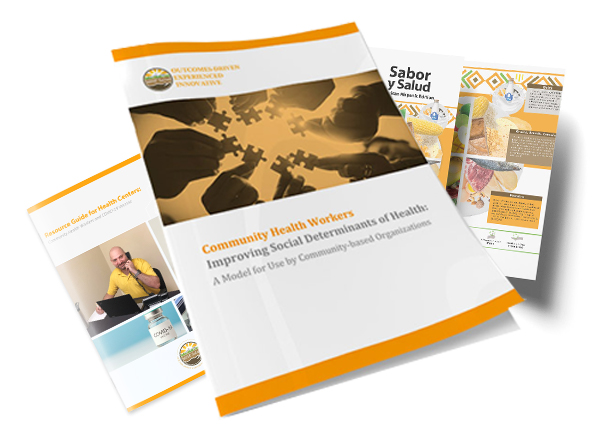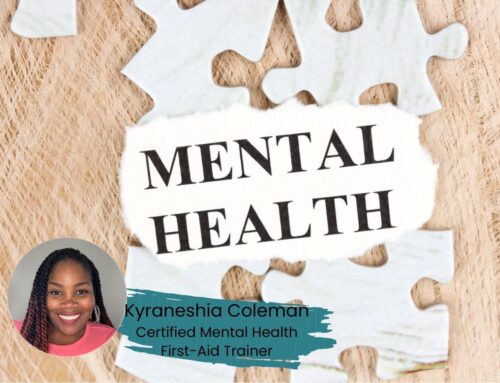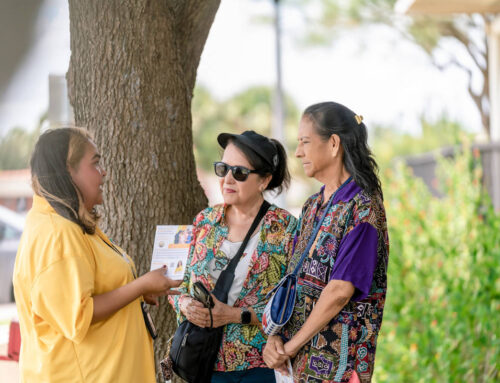Actions that Impact Mental Health among Older Adults
Published January 2023 | Read this article in Spanish.
- Age-based stereotyping, prejudice, and discrimination have a negative effect on aging with dignity
- Older adults exposed to ageism experience negative health consequences
- Healthy aging includes supporting mental health and wellbeing
- CHWs raise awareness about the negative impact of ageism on mental health
Ageism is more than just a word.
Did you know that Ageism is more than a term associated with how a person thinks about aging (or your age)? Ageism can be followed by actions that can have a negative impact on a person’s mental health. Older adults may experience stereotyping, prejudice, and discrimination based on age. As we take a closer look at the impact ageism has on older adults’ mental health, we encourage you to think about ageism as actions when engaging with older adults. – How we talk, act, and think! Checking our biases and stigmas can help avoid or reduce actions promoting ageism.
Experiencing Ageism for short or long periods of time can affect your self-esteem and mental health.
Many older adults exposed to ageism have increased mental health and health problems such as:
- stress, anxiety, and depression
- chronic illness
- low self-esteem
- and increases the risk of suicide (more prevalent among men than women)
Mental Health is linked to our feelings, health, and well-being. Experiencing ageism, stigma, or stereotyping can affect self-esteem and mental health because an older adult can internalize it, and those thoughts become self-directed. This means that if you repeatedly experience negative words and actions because of your age, it can contribute to low self-esteem or how you view or feel about yourself. Ageism can impact the quality of life of an older adult because of how it affects how an individual embraces aging.
Hispanic/ Latinos: A Cultural Approach to Aging
What can we do to create awareness of ageism’s negative impact on mental health?
The first step towards change is acknowledging ageism’s negative impact on older adults. A positive reaction works on accepting aging as an individual right to age with dignity. We can support older adults with actions that promote equality and respect.
Hispanic Latinos make up about 9.2% of the older adult population and are expected to make up 21% of all older adults in the U.S. by 2060! Hispanic Latino communities include culture and experiences specific to older Hispanic Latino adults in their efforts to reframe aging. Reframing aging begins with changing the way we think about aging.
A national survey on healthy aging shared that 82% of older adults experience more than one form of ageism daily. The National Council on Aging focuses on promoting older adults’ wisdom and lived experiences that communities can use to identify and overcome barriers. A positive response to ageism is to increase awareness within your support systems. You can begin by sharing how you feel about aging and ageism with your family and friends.
How to React Positively: Create Awareness!
CHWs have an opportunity to implement positive strategies that address ageism within their communities, community partners, and medical professionals.
Community Health Workers (CHWs) are trusted members of their communities that link individuals to social and health resources. Because CHWs are part of their communities and share lived experiences, they can also help support a culturally appropriate approach to reframing aging by:
- Creating learning opportunities about ageism and healthy aging within their communities
- Identifying and addressing mental health stigmas or other barriers
- Linking the community to culturally appropriate resources
- Engaging older adults in community conversations geared to support healthy aging
MHP Salud offers innovative strategies through our training, consulting, and support services
We can help you improve health outcomes in your communities! Our Technical Assistance team will support and strengthen your CHW program.
This project was supported by the Administration for Community Living (ACL), U.S. Department of Health and Human Services (HHS) as part of a financial assistance award totaling $213,112 with 75 percentage funded by ACL/HHS and $73,094 amount and 25 percentage funded by non-governmental source(s). The contents are those of the author(s) and do not necessarily represent the official views of, nor are an endorsement, by ACL/HHS, or the U.S. Government.
Blog Topics

This preventative care checklist will help older adults keep up to date with their recommended checkups and care services.







